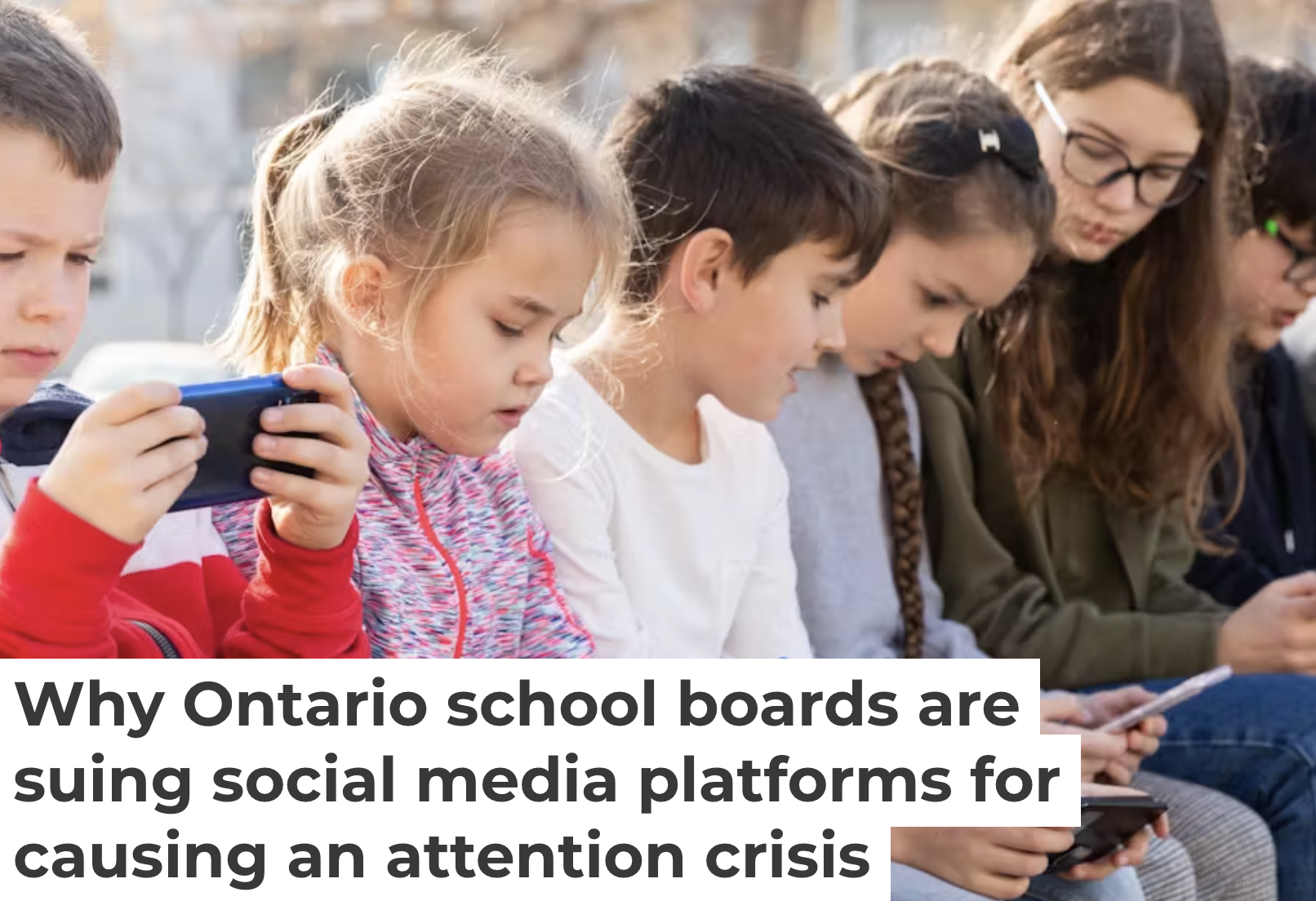Let’s Show Kids How Good they Can Have It
Four major Ontario school boards—Toronto, Peel, Ottawa-Carleton, and Toronto's Catholic counterpart—are suing some of the largest social media companies, alleging that their products' designs have negatively rewired the way children think, behave, and learn and disrupted the way schools operate.
As a digital wellness consultant with schools across the Greater Toronto area and beyond, I can attest to the truth of their statements. Students, teachers, and school administrators are collectively at a loss about managing technology—particularly phones—in and out of the classroom.
I lead a digital wellness company that helps schools like Toronto District School Board’s Ursula Franklin Academy and colleges like Virginia Tech improve social connectedness and academic focus. Before I work with a school, my team conducts in-depth interviews with teachers, students, and administrators to determine an internal baseline to measure our digital well-being program's impact.
In these interviews, students share the following feelings:
“I think a lot of us are addicted but it is not our fault – we were raised like this.”“Technology was all we used during COVID, I think that’s why we are all addicted.”
“I think we rely on our devices too much. It feel like my attention span has shrunk.”
“I think we all need ways to balance. Teach us how to manage it well.”
To summarize the average high schooler's feelings, “I don’t think adults understand our reality. We have never known anything else.”
Students: Adults Don’t Understand Our Reality
Today’s adolescents live in the era of everywhere being everywhere and anything being everything—a time when AI blurs the lines of reality and digital capitalism drives the terms of social engagement to the extent that students are left wanting, wanting for something real.
“Adults can’t really imagine how bad kids feel,” says youth advocate Sean Killingsworth, creator of the unplugged Reconnect movement. “In the social wasteland that exists in schools today, you’re already rejected before you say anything.”
A recently interviewed student at a large suburban religious high school echoed Sean’s sentiments, saying, “I think people used to have more fun.”
Why would they say this? Why is this so?
Why aren’t kids choosing to spend time offline?
To say that these technologies are neutral flies in the face of how people really behave. Tim Wu, author of The Attention Merchants, says that the most significant impact of today’s profit-driven social media platforms and Big Tech companies like Amazon and Uber is that “they constrain what we are willing to do.”
On an average day, you and I spend more time with our digital products and platforms than we do with any single human being. Because of this, we constantly put ourselves in the way of the three sirens of consumerism: comfort, control, and convenience—the drivers of Big Tech, Big Corporations, Big Everything.
Over time, they’ve shaped the way we think about relationships, the way we work, learn, create, and even the ways we relate to one another — how we are willing to love.
These are Big Tech's three false promises, conditioning us to believe that happiness can be found through convenience, comfort, and control. Humans' greatest source of happiness is relationships, and anyone who has raised a child, built a solid friendship, or sustained a marriage knows there is nothing convenient, comfortable, or controllable about them.
Here’s what I am trying to say: the tech that shapes our lives is at odds with how humans work.
Students Have Goals. Social Media has One Goal: To Make them Forget their Goals.
When you ask students what they hope to get out of their high school or college experience, they say things like: make friends that will stick with me after school, create memories I can share with my kids one day, pick up new skills and create a good foundation for my future.
In other words, our kids have goals. YouTube has one goal. To make our kids forget their goals.
It’s up to us as adults to show our kids how good they could have it, helping them experience the joy of missing out on the right things — life-taking things like toxic hustle, online social comparison and digital overwhelm.
My husband Michael and I are parents to three children ages 14, 12 and 10. Recently, to observe the Christian season of Lent, we chose to fast all streaming services, including YouTube (except for school use,) for 40 days.
Removing this endless stream of entertainment was initially painful, even for me. It’s easy for me to default to pre-bedtime binge-watching to decompress and for the kids to fill their time with video content. Within days, I noticed the shifts taking place in our home. The kids got bored, which led them to seek out connections with each other to take on projects like baking, cooking, and playing sports—together.
Adults: Empower Kids to Experience the Joy of Missing Out on the Right Things
We are in the midst of a global epidemic of loneliness as well documented by the US Surgeon General in last year’s Advisory on the Healing Effects of Social Connection and Community and the work of leading researchers like Dr. Jean Twenge and Jonathan Haidt.
Smartphones and social media were designed for ease of use, so easy that students forget that what makes them happy is right behind that screen: friendships, active hobbies, nature and play.
In a New York Times reflection, María de Lourdes Ruiz Scaperlanda wrote a reflection on the season of Lent, a 40-day fast leading up to the remembrance of the death and resurrection of Jesus in Catholic, Protestant and Orthodox traditions:
“The question for me is not whether there’s a point to giving things up during Lent, but whether I should ever stop fasting from all that numbs, dulls and deadens me to life, all of life, as it is today — the good and the bad. Fasting makes me willing to try.”
The allure and addictive design of platforms like TikTok have numbed, deadened and dulled our youth to life's simple — and free — joys.
It is up to us as adults to create scree-free spaces to help them disconnect to reconnect.
_
Christina Crook is the award-winning author of The Joy of Missing Out: Finding Balance in a Wired World, harbinger of the global #JOMO movement, and Good Burdens: How to Live Joyfully in a Digital Age. She leads JOMO(campus), a digital wellness company helping college and high school students across North America improve social connectedness and academic focus.
Learn more about JOMO(campus) here.

